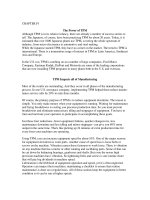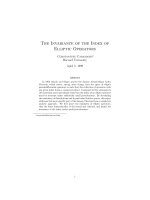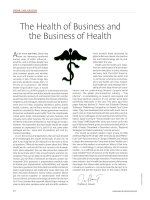Tài liệu The Meaning of Mandela pdf
Bạn đang xem bản rút gọn của tài liệu. Xem và tải ngay bản đầy đủ của tài liệu tại đây (126.42 KB, 12 trang )
The Meaning of
Mandela
A Literary and Intellectual Celebration
Edited by Xolela Mangcu
Foreword by Archbishop Desmond Tutu
Free download from www.hsrc
p
ress.ac.za
Compiled by the Society, Culture and Identity Research Programme of the
Human Sciences Research Council. Project Manager: Adrian Hadland
Published by HSRC Press
Private Bag X9182, Cape Town, 8000, South Africa
www.hsrcpress.ac.za
© 2006 Human Sciences Research Council
First published 2006
All rights reserved. No part of this book may be reprinted or reproduced or utilised in any form
or by any electronic, mechanical, or other means, including photocopying and recording, or in
any information storage or retrieval system, without permission in writing from the publishers.
ISBN 0-7969-2164-4
Copy editing by Sean Fraser
Typeset by Tracey Fraser
Cover design by Tracey Fraser
Cover photograph by Alf Khumalo
Photograph on page iii by Benny Gool
Print management by comPress
Distributed in Africa by Blue Weaver
PO Box 30370, Tokai, Cape Town, 7966, South Africa
Tel: +27 (0) 21 701 4477
Fax: +27 (0) 21 701 7302
email:
www.oneworldbooks.com
Distributed in Europe and the United Kingdom by Eurospan Distribution Services (EDS)
3 Henrietta Street, Covent Garden, London, WC2E 8LU, United Kingdom
Tel: +44 (0) 20 7240 0856
Fax: +44 (0) 20 7379 0609
email:
www.eurospanonline.com
Distributed in North America by Independent Publishers Group (IPG)
Order Department, 814 North Franklin Street, Chicago, IL 60610, USA
Call toll-free: (800) 888 4741
All other enquiries: +1 (312) 337 0747
Fax: +1 (312) 337 5985
email:
www.ipgbook.com
Free download from www.hsrc
p
ress.ac.za
To Nelson Rolihlahla Mandela –
for the gift of freedom
Free download from www.hsrc
p
ress.ac.za
Free download from www.hsrc
p
ress.ac.za
Contents
Foreword
Archbishop Desmond Mpilo Tutu vii
Preface
Xolela Mangcu xi
Introduction
Xolela Mangcu xiii
1 WEB Du Bois, Encyclopedia Africana and Nelson Mandela
Henry Louis Gates Jr 1
2 Nelson Mandela: Great exemplar of the grand democratic tradition
Cornel West 13
3 Views from a palette of the cultural rainbow
Wole Soyinka 24
Free download from www.hsrc
p
ress.ac.za
Free download from www.hsrc
p
ress.ac.za
Foreword
Archbishop Desmond Mpilo Tutu
How fitting it is that these men of letters – Henry Louis Gates Jr, Cornel West
and Wole Soyinka – should visit our shores to pay tribute to our beloved Madiba
on the occasion of his 87th birthday. I must extend my congratulations to the
organiser of these lectures and the editor of this book, Xolela Mangcu, for
pulling off such a wonderful achievement. To get only one of them would have
been a source of satisfaction on its own, but to get them to share a platform is
indeed a remarkable feat. Each in his own right has changed the way we think
about our world.
Henry Louis Gates Jr has done more than any other in building at Harvard
University the leading African American studies programme in the United
States, and now I hear that this programme has been expanded to African
American and African studies. Gates assembled at Harvard the famous
Dream Team of scholars such as Cornel West, Kwame Anthony Appiah, Evelyn
Higginbotham, William Julius Wilson and others. The Encyclopedia of the
African and African American Experience, which he co-edited with Kwame
Anthony Appiah, is a work of historical proportion that should be made
available in every school and university. It is the kind of work that our own
scholars should emulate. We should begin to record the history of intellectual
ideas and how those ideas fed into the struggle for freedom.
Cornel West is a dear brother of the Church who has been known to me for a
very long time. The last time he was here was during the dark days of
apartheid, when we visited some of our communities together. We went to
Port Elizabeth and Duduza in the then East Rand. West has literally changed
the way we think and talk about race. His book Race Matters stands as one of
the classics of American and world political philosophy. He tells us about the
continued relevance of race without falling into the trap of what he calls ‘the
pitfalls of racial reasoning’. He writes that black people should speak candidly
about their victimisation without seeing themselves as perpetual victims. He
is as critical of the breakdown of community as he is of the structural and
vii
Free download from www.hsrc
p
ress.ac.za
economic imbalances that produce such a breakdown. He manages a skilful
synthesis between materialist structural analysis and cultural analysis, earning
himself the exalted rank of university professor at institutions such as Harvard
and Princeton.
And what can I say about my comrade and fellow Nobel Laureate Wole
Soyinka? For decades, Soyinka has been speaking truth to power in his
beloved Nigeria, often at great personal risk. His name is synonymous with
both Nigeria’s remarkable literary achievements and the constant struggle
for peace and justice for all the Nigerian people. It was in recognition of his
literary genius that he became the first African writer to be awarded the Nobel
Prize for Literature. His book Death and the King’s Horseman is an all-time
classic, and so are many of his plays and poems, including Mandela’s Earth,a
volume of poems he wrote during Madiba’s long incarceration on Robben
Island. Soyinka’s artistic achievements as Africa’s leading playwright, poet,
essayist, novelist, political commentator and social critic are matched only by
his courage as a political activist and cultural worker. He once said that ‘social
commitment is a citizen’s commitment and embraces equally the carpenter,
the mason, the banker, the farmer, the customs officer, etc., not forgetting the
critic. I accept a general citizen’s commitment which only happens to express
itself through art and words.’
In these times of global warfare and strife, when nation is pitted against
nation, and religion against religion, Nelson Mandela stands out as a global
icon for peace, love, reconciliation and magnanimity. However, as these
distinguished public intellectuals point out, we should neither banalise
the meaning of Mandela nor put him on a pedestal that will make him
inaccessible to the people for whom he struggled. Instead, we should
understand more the historical forces and social values that shaped and
influenced his leadership. Cornel West is absolutely right in suggesting that
Madiba belongs in the democratic, freedom-loving tradition of Jesus, Socrates,
and WEB Du Bois. This is a journey that reached its culmination in our own
miracle in 1994. But, as Madiba has reminded us so often, we have only
achieved the freedom to be free. Our country still faces many challenges –
unemployment, greed, inequality and the devastation visited on our communities
and young ones by the HIV/Aids pandemic. We cannot waver or falter in our
quest to leave our children and grandchildren with a world better, safer and
more just than the one we inherited. Our challenge is to make sure that never
viii
THE MEANING OF MANDELA
Free download from www.hsrc
p
ress.ac.za
again shall the race, ethnicity, religion, gender and sexual orientation of any
person or group of persons be the cause of their suffering. Intellectuals are, of
course, keepers of memory. They remind us, as these fine intellectuals do in
these lectures, that struggle is a permanent feature of the human condition.
The conduct of that struggle requires moral and ethical resources that can
only come out of a sense of history. But as Soyinka notes in one of his essays,
‘The Writer in an African State’, ‘a historic vision is of necessity universal’.
It is thus the more appropriate that Madiba’s historic vision be shared and
celebrated by all of humanity especially at such times of peril. Just like the
great American civil rights leader had taken the struggle beyond the civil
rights era to what he called the poor people’s movements, Madiba has become
a beacon of peace and hope for millions through his charitable foundations –
the Nelson Mandela Foundation, The Nelson Mandela Children’s Fund and
the Mandela Rhodes Foundation – as well as through his personal interventions
to broker peaceful resolution of what once seemed intractable conflicts. He
describes his work as the continuation of the struggle for freedom: ‘I have
walked that long road to freedom. I have tried not to falter; I have made missteps
along the way. But I have discovered the secret that after climbing a hill, one
only finds that there are many more hills to climb. I have taken a moment here
to rest, to steal a view of the glorious vista that surrounds me, to look back on
the distance I have come. But I can rest only for a moment, for with freedom
comes responsibilities, and I dare not linger, for my long walk is not yet
ended.’ Thank you, thank you, thank you to these great intellectuals for
inspiring us to continue in Madiba’s footsteps.
Archbishop Desmond Mpilo Tutu
May 2006
ix
FOREWORD
Free download from www.hsrc
p
ress.ac.za
Free download from www.hsrc
p
ress.ac.za
xi
Preface
In October 2004 I joined the Human Sciences Research Council as Executive
Director of the Society, Culture and Identity Research Programme. My aim,
among other things, was to make our research programme a centre of public
deliberation. My colleagues and I fashioned a lecture series entitled ‘Identity,
Africa and the World’. The idea was to bring the South African public into
conversation with scholars from around the world dealing with the issue of
identity on the African continent. Some of the people who delivered these
lectures included distinguished writers such as Ayi Kwei Armah (Senegal),
Dani Nabudere (Uganda) and Mahmood Mamdani (Uganda). The HSRC
auditoriums were filled to capacity, confirming in many ways the hunger for
public deliberation in the broader society. Lectures, especially when they are
free and open to the public, are important not only for the substantive issues
that they raise but also for the culture of critical and open inquiry that they
inculcate among those who participate in them. They dispense with notions
of membership, loyalty or party political identification. Everyone is free to
enter the open space to engage the speakers and each other.
The decision to organise a series of lectures on Nelson Mandela is discussed
in the Introduction; suffice to say that it fell squarely within the broader theme
of locating Africa’s unique contribution to the world – which continues to, in
the words of Steve Biko, give the world ‘a more human face’. No person better
embodies that legacy than Nelson Mandela. The further decision to publish
the lectures in this book was motivated by the desire to see more scholarly
reflection on Madiba’s legacy. Henry Louis Gates Jr, Cornel West and Wole
Soyinka were chosen for the intellectual leadership role they have played in
shaping how we think about the African world in general.
A number of individuals and organisations made ‘The Meaning of Mandela’
lectures possible. First, I would like to acknowledge the former head of the
HSRC, Mark Orkin, during whose tenure the lectures took place. The members
of the Society, Culture and Identity Research Programme – Adrian Hadland,
Free download from www.hsrc
p
ress.ac.za
Mcebisi Ndletyana and Pumla Gqola – played a pivotal role in conceptualising
the series. Jean Witten and Pam Mbuli provided excellent administrative
support. I would also like to acknowledge the support of the HSRC’s corporate
communications team – Jackie Mfeka, Ina van der Linde and Marise Taljaard –
for developing our communications strategy. The operations division made sure
that there were no hiccups in managing the large crowds. Thanks therefore go
to director of operations Adeola Adesanya, Johan Louw, and sound engineering
consultant Kentse Mphahlwa for the sound system and logistics, as well as
George Matsane for his help during the lectures, particularly with the sound
system. Event management consultants Raks Seakhoa and Write Associates
played an important role in managing certain logistical and communications
aspects of the lectures.
I am grateful, too, for the support given by the Nelson Mandela Foundation,
particularly in relation to the lecture series. A special vote of thanks goes to
Mrs Graca Machel, Zelda le Grange and John Samuel. The Department of
Arts and Culture, the Ford Foundation and the Open Society Initiative
for Southern Africa donated generously towards the costs of the lectures. I
would also like to acknowledge the support of South African Airways, the
Financial Mail, Business Day, the Sunday Times, Johnnic and the South African
Broadcasting Corporation.
Finally, the extracts from Soyinka’s works in his lecture are reproduced here
with the kind permission of the author.
Xolela Mangcu
May 2006
xii
THE MEANING OF MANDELA
Free download from www.hsrc
p
ress.ac.za









